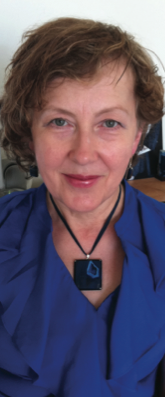Irene Pestov Scholarship
19 Sep 2013 - 09:55:14 in Achievement
Irene Pestov Scholarship
 The Irene Pestov Memorial Scholarship has been set up by Vladimir, Xenia and Sviatoslav (Slava) Pestov in memory of their late wife and mother Irene Pestov, who completed her PhD in Mathematics at Victoria between 1993 and 1996.
The scholarship aims to assist female students in the area of mathematical sciences or geosciences to complete their MSc or PhD thesis, by helping to extend enrolment in the final months of writing up their thesis.
Dr. Irene Pestov (1956–2013) completed her PhD studies under the joint supervision of Dr Mark McGuiness (Victoria University) and Dr Graham Weir (Industrial Research Limited), supported by the Victoria University Postgraduate Scholarship.
Born in Eastern Siberia, Irene went on to obtain a degree in Applied Mathematics from Tomsk State University. After moving to New Zealand with her family and successfully defending her thesis in October 1996, Irene held a postdoctoral position in Sendai, Japan. From 1999 she worked as a research scientist at the Australian Geological Survey in Canberra (later her division was transferred to the Department of Agriculture, Fisheries and Forestry, Australia).
Subsequent career moves saw Irene working as a research scientist in civil engineering at the University of Ottawa, Canada, then as an independent engineering consultant, and, from 2007, a senior research scientist at the Centre for Operational Research and Analysis (CORA) of the Defence Research and Development Canada (DRDC) in Ottawa. Irene’s research output was extensive and varied, reflecting her multidimensional career path.
In her Victoria thesis, Irene showed how a vapour-liquid counterflow in geothermal systems can evolve to form two layered structures, one being water-dominated and the other steam-dominated.
While working in Australia, Irene proved conclusively that thermal convestion is the most important transport mechanism in most of the Great Artesian Basin. This is considered by some researchers to be her most significant discovery. At CORA-DRDC, Canada, Irene developed a net- enabled approach to Arctic search and rescue, with a potential to save lives.
Irene’s hope and one of her last wishes was that this scholarship would aid female scientists to persevere in the face of difficulty in order to complete their graduate studies.
The Irene Pestov Memorial Scholarship has been set up by Vladimir, Xenia and Sviatoslav (Slava) Pestov in memory of their late wife and mother Irene Pestov, who completed her PhD in Mathematics at Victoria between 1993 and 1996.
The scholarship aims to assist female students in the area of mathematical sciences or geosciences to complete their MSc or PhD thesis, by helping to extend enrolment in the final months of writing up their thesis.
Dr. Irene Pestov (1956–2013) completed her PhD studies under the joint supervision of Dr Mark McGuiness (Victoria University) and Dr Graham Weir (Industrial Research Limited), supported by the Victoria University Postgraduate Scholarship.
Born in Eastern Siberia, Irene went on to obtain a degree in Applied Mathematics from Tomsk State University. After moving to New Zealand with her family and successfully defending her thesis in October 1996, Irene held a postdoctoral position in Sendai, Japan. From 1999 she worked as a research scientist at the Australian Geological Survey in Canberra (later her division was transferred to the Department of Agriculture, Fisheries and Forestry, Australia).
Subsequent career moves saw Irene working as a research scientist in civil engineering at the University of Ottawa, Canada, then as an independent engineering consultant, and, from 2007, a senior research scientist at the Centre for Operational Research and Analysis (CORA) of the Defence Research and Development Canada (DRDC) in Ottawa. Irene’s research output was extensive and varied, reflecting her multidimensional career path.
In her Victoria thesis, Irene showed how a vapour-liquid counterflow in geothermal systems can evolve to form two layered structures, one being water-dominated and the other steam-dominated.
While working in Australia, Irene proved conclusively that thermal convestion is the most important transport mechanism in most of the Great Artesian Basin. This is considered by some researchers to be her most significant discovery. At CORA-DRDC, Canada, Irene developed a net- enabled approach to Arctic search and rescue, with a potential to save lives.
Irene’s hope and one of her last wishes was that this scholarship would aid female scientists to persevere in the face of difficulty in order to complete their graduate studies.
